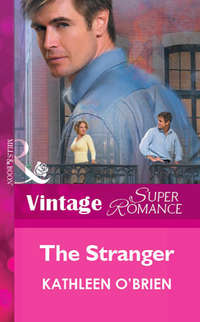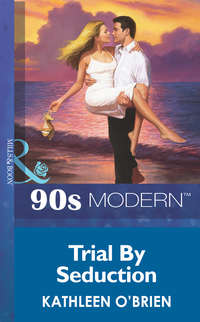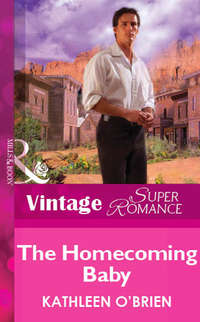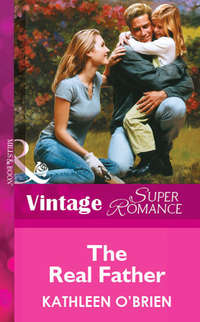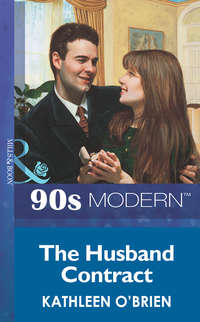
Полная версия
The Rancher's Dream
It hadn’t always been like this. When she’d first moved in, he’d usually been horny in the mornings. When his alarm went off, he’d hit the snooze button, and then he’d reach over and shove her nightgown up around her waist with a quick jerk that was supposed to be a joke. She slept on her side, so he’d angle her hips and take her in a spoon position, sometimes before she was even fully awake.
He’d always be finished long before the alarm went off again.
Funny. She could remember when she’d found that kind of primitive dominance weirdly thrilling. It had seemed manly. Simple, earthy and real. Maybe it wasn’t technically satisfying, in that she never...well, it never made her...
But it had turned her on, even so. It made her feel female and desirable. It had made her feel alive, as she had never felt alive in the mansion on Callahan Circle.
But Rory hadn’t touched her in the morning for weeks. They still had sex, of course, but mostly at night, after he got home from work. He’d shower first, naturally. He hated the stink of the shop. All through dinner, he’d bitch about the customers and the other mechanics, and Joe, the owner. He’d keep up a running monologue as he wolfed the food down, even when she’d made something really complicated and special for him as a treat.
And when he was finished eating and complaining, he’d want to have sex. Lately, she’d stopped even thinking of it as “making love.” It was just sex. Just a way to let off steam, like eating or complaining.
She knew what this change in him meant. It meant he was terribly, terribly unhappy. He hated his job. He hated his poverty, this apartment, the fact that her father had disowned her for moving in with a blue-collar loser like him.
What she didn’t know was what to do about it. She didn’t know how to make him happy again.
She listened to him moving around the small apartment now, mentally following the routine, gauging how long till he would be gone. She had to pee, too, but she didn’t want to risk tying up the bathroom at the very moment he needed it.
He was in a superbad mood today, she could tell. His steps were heavy on the uncarpeted floors, and he made a big to-do of trying to find a clean spoon for his coffee in the silverware drawer. She wondered whether, at least subconsciously, he wanted to wake her, specifically so they could have a fight.
He resented that she only had a part-time job at Fanny Bronson’s bookshop and didn’t have to get up as early as he did. He was always telling her she needed to look harder for something full-time, or at least another part-time gig.
He was running late. She could tell by how rushed his movements were. Too rushed. Suddenly she heard his coffee mug hit the kitchen floor. The ceramic splintered on the wood like a china bomb.
He cussed loudly, using the F word, which he once had kept off-limits, around her, anyhow.
“I don’t have time for this shit,” she heard him say. She did not hear the sound of the broom closet opening, or the swish of bristles across the floor or the clink of broken pieces collecting in the dustpan.
She merely heard the cabinet open, the trickle of coffee filling a new mug, and then Rory slamming the pot back on the stove with undisguised hostility. As if she, not he, had broken the first mug.
Becky wondered whether she could get away with feigning sleep any longer—even the dead couldn’t sleep through all this—but she didn’t have the courage to open her eyes.
She heard him stomp to the bedroom door. He stood there a minute, and she knew he was staring at her. She tried to breathe regularly, but her lungs felt like iron. And she wasn’t sure what her real-sleep breathing sounded like. Was it fast? Slow? Noisy? Did she snore? She ought to record herself sometime, she thought numbly, so she could imitate it more accurately.
After what seemed an eternity, he cursed again, smacked the door frame with the palm of his hand and left the apartment. Even then, she didn’t get up. She waited until she heard his truck rumble to life in the parking lot outside their window. When he turned the corner onto Cimarron Street, and its sputtering sound died away, she finally pushed back the covers and stood.
Her legs were oddly unsteady, and her stomach felt loose and unpleasant, as if she’d swallowed a gallon of dirty water. She put her hand over her navel, hoping to might stop the sudden surge of nausea.
Was she coming down with stomach flu?
She hoped not. Fanny was a good boss, but she didn’t offer sick leave to her part-timers, and Becky needed the money. She’d sold a gold chain last week to cover her half of the rent, and she didn’t have much more of her good jewelry with her at the apartment.
She’d left most of it back at the Callahan House on purpose. To make a statement. To show her father she didn’t give a damn about his money. She didn’t need it. Where she was going, the currency was love.
Her father had laughed. “Let’s see how much he loves you when you’re not decked out in diamonds and gold.”
How sad, how indescribably sad, to discover her father was right, after all. It wasn’t that Rory didn’t love her unless she had money—it was just that nothing could bloom in an atmosphere of this much stress and financial worry. Not even love. Nothing could go right at home when a man spent all day at a job he hated, with people who didn’t value him.
After she used the bathroom, her stomach felt a little more settled, so she cleaned up the broken mug, made the bed and took a shower. She still felt light-headed, but not actually ill, so she decided not to call in until she tried having some breakfast.
But when she sat down at the kitchen table and ate her first spoonful of cereal, she suddenly doubled over with nausea. She rose blindly, knowing she would never make it to the bathroom. She turned toward the sink.
And vomited.
She stood there many minutes afterward, shaking strangely, her elbows pressing against the cold stainless steel. She stared into the sink. She’d had nothing in her, really, so nothing much had come up except greenish bile that had slipped right down the silver drain.
At the thought, her stomach turned again. Helplessly, she retched, desperately trying to gather her long hair and keep it from falling into her face. Again, nothing came up except a thin, sickly stream of water.
So it couldn’t be anything she’d eaten. What was it? Was it nerves? Was it Rory?
Bowing her head, she made a small sobbing sound. She felt confused and weak, as if she wanted to curl up on the floor and cry for her mommy. But she hadn’t had a mother since she was eight years old. And she hadn’t had much of one, even before that.
“Jesus, what the hell is this?” Rory’s voice was suddenly right behind her. “Don’t you have to be at work in half an hour?”
She let her hair drop from numb fingers. She whirled around to face him, too shocked to take offense at his tone. What was he doing home? He should be at the garage, shouldn’t he?
“I...I’m not feeling that great,” she stammered. “I was thinking I might call in sick.”
“Oh, yeah?” His handsome face looked menacing, suffused with dark, angry blood. He strode to the sink and caught her by the arm. His fingers were so tight she swore she felt them reach her bone.
“Well, you better think again. You’re going in no matter how you feel. We need that money. Especially now.”
She swallowed. Her mouth felt sour and unclean. “Why especially now?”
“Because only one of us can sit around in our pj’s eating bonbons, princess, and it’s my turn now. That bastard Joe Mooney just fired me.”
CHAPTER FOUR
“YOU KNOW ABOUT this horse, I guess.”
Dusty Barley, the crusty old trainer who had answered Campbell Ranch’s call for help the other day, shot a quick glance at Grant, who was watching the halter training from just outside the paddock fence.
“Know what?” Grant was definitely interested in Barley’s opinion. Cawdor’s Gilded Dawn was the horse he hoped to sell to his deep-pocket buyer Monday night. Grant thought the three-year-old filly was fabulous, but if she had a defect he needed to know about it now.
“Ah, well, yep, of course you know.” Barley always talked softly, as if he were thinking aloud, which maybe he was. He also sounded as if he had a mouth full of gravel, probably the result of his crowded and crisscrossed teeth. “But I still gotta say it. This one’s gonna be special, Campbell.”
Grant held back a sigh, watching as the copper filly flicked her beautifully elevated tail. As Barley prompted her to step to the right, her muscular hips caught the sunlight, gleaming as if she truly were made of gold.
Barley was right, of course. Barley was always right. That’s why Grant couldn’t afford him at Campbell Ranch, not full-time. It had been a small miracle he’d been able to get him on such short notice Wednesday—and hold on to him for three whole days now.
“So...I’m just saying.” Barley kept his voice steady as he moved around the young filly, careful not to spook her. “You sure you don’t want to keep this one?”
“I never said that.” Grant leaned on the post, taking the weight off his bad foot. The grass was soft, but right now it felt harder than concrete. “I just said I’ve got a buyer coming from California to look at her.”
“Yep.” Phlegmatic as ever, the older man put the crop close to the young filly’s nose. She didn’t flinch. “Good girl. Good girl. Still. This one’s got star quality. Look at that neck.”
Grant didn’t answer. Truth was, he was 100 percent sure he did want to keep her. But he was 99.9 percent sure he couldn’t afford to.
She would have been perfect, though. If he was going to maintain a breeding program, and not just a boarding and training stable, he needed a foundation mare. Up to now, Charisma Creek had been his dam, but she was reaching the end of her breeding years.
If Campbell Ranch was going to make a name for itself, Grant needed a champion maker, a consistent producer with a good bloodline. And he needed her soon.
Dawn could be that mare.
Though she was very young, she already had the most extraordinary elegance—a high, airy motion and impeccable conformation. She had a swan-like neck, a flat topline, a perfectly dished head. Her eyes were soulful and intelligent.
Plus, as Barley pointed out, she had that indefinable something that made a star. Everyone fell in love with her. The best Arabians were as pretty in the face as cartoon horses, as powerful in carriage as thunderbolts and as graceful in motion as water. Dawn was all of that...and then some.
Barley finished the lesson, led Dawn to the carrots and then let her loose to romp a bit in the outdoor paddock.
Grant followed the filly with his gaze. She covered so much ground when she ran—and yet she still had amazing elevation. He wished he’d brought a video camera. It was a beautiful morning, the sun sparkling like an enormous gold sequin overhead, and the grass studded with a thousand wildflowers that seemed to have sprung up all at once.
Amid all that picture-postcard color, Dawn looked like a dancing sunbeam.
“Thanks,” Grant said as Barley sauntered over toward him at the fence. “You really brought her along today. If you can stay, the boarders need turnout, too. And I’d love to hear what you think about the horse in stall five. His owner wants to sell, but I’m not so sure. I’d planned to ride him a bit this week, but...”
Damn his useless arm. It was going to cost him a fortune to hire out all this work. And he hated feeling cooped up. Pinned down. Irrelevant. He loved the horses, and he loved this land. He wanted to be doing something active, something that mattered.
Instead, for the past three days, he’d been clumsily typing with one finger and making endless phone calls. And watching while other people did the real work.
“I can stay.” Barley shrugged, as if it was no big deal. “Olson said you needed help, and that cast there says he wasn’t kidding. I’m yours as long as you need me.”
Grant was relieved—and a little flattered. Everyone knew Barley operated more on gut instinct than on schedules. No one else could get away with being so elusive, but Barley could.
At first glance, he didn’t look particularly impressive. A scrawny older guy, probably not even ninety pounds dripping wet, with a big black mustache and curly black hair that fell to his shoulders. He walked bowlegged and dressed scruffy.
But he knew horses, and he could work miracles.
That meant he didn’t have to commit to anyone long-term, and he rarely did. He was like rain—you couldn’t summon it, and you couldn’t keep it from floating away to the next guy’s acres, but you were grateful for every drop that fell your way.
“Actually,” Grant corrected ruefully, “you’re only mine as long as I can afford you. Which, if I don’t sell Dawn Monday night, isn’t very long.”
“Monday night, huh?” Barley made a thoughtful sound between his teeth. Soberly, he bent over and plucked a snowdrop from a cluster of wildflowers growing beside the post. He threaded its stem into the top buttonhole of his vest. Then he tipped back his hat and watched Dawn cantering in the sunlight.
“That’s a damned shame, Campbell. Truly.”
“Yes,” Grant said with feeling. “Yes, it is.”
“Okay, then. I guess I’ll look at that horse in number five.” Barley saluted Grant wryly and started to walk away, but stopped after just a few feet and turned back. “Seriously, though. My best advice? Don’t let this one get away.”
Grant raised his brows. For a guy like Barley, who was infamous for his unflappable detachment, this was the equivalent of jumping up and down and screaming.
“Okay,” Grant said. “Message received. I’ll think it over.”
As he watched the little man stride away, the weaving gait of his bowlegs kicking up dirt, Grant tried to stay calm. No point letting wishful thinking run away with him.
The two truths weren’t incompatible. Barley could be quite right about Golden Dawn’s value, and Grant could also be quite right about needing to sell her.
But Grant was the only one who had the big picture. He was the only one who had seen both the horse and the solvency projections. All of his financial planner’s clever graphs and charts showed Campbell Ranch nose-diving straight into bankruptcy if they didn’t make their targeted income every month, rain or shine.
Without this sale, he didn’t even come close to that target. And that was before he factored in all the extra expenses his broken arm would create. Not to mention the medical co-pays and deductibles.
If he tried to hold on to every good horse he encountered, instead of selling it, he might as well shut up the ranch now and head out to Memphis, where his father-in-law so desperately wanted him to be, in the job his father-in-law was dangling like a carrot.
He liked Ben Broadwell. And the job, heading up the foundation to help disadvantaged youths with after-school programs, literacy tutors and various kinds of mentoring, was a worthwhile cause. But...
But Ben Broadwell wasn’t his father-in-law anymore, really. Not since Grant’s wife, Brenda, had died. And if Grant took that offer, it was as good as saying he would never be any more than a dead woman’s grieving widower.
That might be true, in the end. But surely he hadn’t reached the end yet. Surely there was still hope that he could build a meaningful life of his own.
So...he had to sell Dawn. Debate settled.
Or at least it should be. Still, he lingered by the paddock watching the filly romp and play awhile longer, even though his foot ached and a mountain of paperwork called.
“Hey, mister!”
He turned at the sound of Crimson’s voice. To his surprise, she was only ten feet away, walking toward him. She wore soft, faded jeans and a loose shirt as blue as the columbines she waded through.
The sun brought out auburn highlights in her silky brown hair and gilded her cheeks, turning her to a kind of gold, just as it had done with Dawn. He felt his body react to her simple, unfussy beauty and had to throw up his guard in a hurry before it could show on his face.
As she drew closer, with Molly draped over her shoulder, and her classic mischievous smile on her lips, she showed no signs of feeling awkward—or sensing that he did. She held up a closed fist and shook it teasingly, the way a gambler might shake a pair of dice before rolling them.
“Can I interest you in some of the good stuff, mister? I’ve been watching you. You look like you could use some serious acetaminophen.”
He checked his watch. He was at least two hours overdue. No wonder his foot was killing him.
“You’re an angel.” He accepted the pills and the small paper cup of water she’d been balancing in the hand that held Molly. He downed both pills in one swallow, realizing only afterward the cup was oddly soggy and bent around the rim.
He looked at the baby, who had swiveled in Crimson’s arms and was now watching him steadily, a frown on her cherubic face. She held out one fat hand and uttered a demanding syllable.
“Oh, sorry, was this yours?” Smiling as he put two and two together, he handed the crumpled cup back. He scraped his lips between his teeth in exaggerated distaste. “Yum,” he said. “Delicious.”
Crimson grinned as Molly gummed the ball of wet paper. “In some cultures, baby slime is considered a delicacy. And speaking of dinner...”
He laughed.
“Marianne tells me you’ve asked her to cater dinner for you Monday night.”
“Yeah.” He wasn’t aware she and Marianne chatted on a daily basis. “I’ve got a foreign buyer coming by. If he nibbles, it’s a big sale, so a little wining and dining seemed in order.”
And Marianne’s dining was the best. She might call the place a “diner,” but the swankiest place in Colorado could take a few pointers from her food. She’d become the go-to spot for catering lately, weddings and funerals, and everything in between.
A disturbing thought occurred to him. What if Marianne had run into trouble?
“Is there a problem? I know I didn’t give her much notice, but Marianne said she could handle it. If she can’t—”
“She can.” Crimson shifted the baby to her other shoulder. “But the way she’s handling it is to ask me to do most of the cooking. I’ve done that for her a couple of times, when she’s been in a pinch. But this time the arrangement seems unnecessarily complicated, don’t you think? I just thought I’d let you know, in case you’d like to eliminate the middleman.”
“No, damn it.” He frowned. “I deliberately didn’t mention the dinner to you because you’re doing too much work around here already.”
And that was absolutely true. Not only did she take care of Molly, and spend hours driving to and from Montrose to see Kevin at the hospital, she’d taken over the cleaning, as well. And for these three days she’d cooked breakfast, lunch and dinner and sent it out to the stable office, where he often ate his meals while he worked.
Then, in the evening, when he was struggling with feeding the horses, she’d somehow materialized in the stables, with Molly in a backpack carrier, and pitched in there, too.
The extra pair of hands was a relief—a godsend, really—but it also made him uncomfortable. When he’d accepted her offer to stay here, he certainly hadn’t intended to turn her into the full-time housekeeper.
And they hadn’t talked about money yet, either. He hoped she knew he intended to pay her for everything. He hadn’t forgotten she’d just been fired, and if she weren’t stuck tending to Molly she’d probably be out there lining up a new job.
“For me, cooking isn’t work,” she said. “It’s fun. I’m pretty good at it.”
He’d discovered that months ago—everyone had, because her contributions to any get-together were always so delicious no one could believe she concocted them in an efficiency apartment’s kitchen.
And since she’d been staying in his house, he’d learned firsthand just how amazing her skills were. And not just with food. With the whole domestic scene.
Because they’d met outdoors, doing manual labor for their outreach program, and, he had to be honest, partly because she was a straight-shooting, spiky-haired body modification artist, he’d never thought of her as the domestic angel type. But boy, had she surprised him. His half-renovated mess of a ranch house had never felt so much like a home.
Maybe that was partly why he was so wrong-footed around her these days. She was so different here...not at all the woman who deliberately preferred to be called Crimson Slash. In fact, it wasn’t until he saw her in her robe the other morning that he’d noticed that her spiky, red-tipped hair was growing out in soft waves around her chin. And wasn’t even red.
“If we’re trying to impress this buyer, I’ve got a beef Stroganoff that’ll have him on his knees.” She wiggled her eyebrows suggestively. “And hey...if you’ve got a spare French maid costume lying around anywhere, I can guarantee a meal he’ll never forget.”
Grant’s imagination served up a quick vision of Crimson in a flouncy black miniskirt and lacy apron. A quick sizzle shot through him—much like the one that had blindsided him that first morning, when he made the mistake of helping her arrange her bathrobe.
He squelched it as quickly as it appeared, as he’d been doing ever since that morning. Indulging even an unspoken attraction to this woman was wrong in so many ways. First and foremost: Kevin.
“Can’t say I’ve got a French maid costume lying around,” he said, laughing easily to show what an innocent joke it all was. “Besides, if you’re going to help with dinner, you’re not going to be masquerading as an employee. You’ll eat with us.”
She was already shaking her head, but he didn’t give her time to protest. “Seriously, Red, you’d be doing me a favor. He’s bringing his girlfriend, and it’ll be more comfortable if I’ve got a date, too.”
She flushed, like a sudden sunburn, and he wished he’d bitten his tongue. Why had he used the word date? That wasn’t how he meant it. He just thought that, in case Stefan was the jealous type, the man might prefer his host not to be conspicuously single.
Crimson wouldn’t be a date. She would be his ally.
So dumb. But to be fair, when had conversation with Crimson become so touchy? Up until three days ago, she’d been the most comfortable female buddy he’d ever had. She was smart, sassy, straightforward and fun. Good-looking, but not hungry for admiration. Actually quite the contrary—with her spiky red hair and no-nonsense clothes, she seemed to be asking for some space.
Around Crimson, Grant could always just be himself. Easy, relaxed, uncomplicated. And then she’d moved into Kevin’s room, and suddenly everything changed.
Well, maybe it was time to change it back.
“What’s that scowl about?” He reached out his good hand and tapped the furrow between her brows. “Since when did the idea of eating dinner with me become a fate worse than death?”
She laughed sheepishly, smoothing Molly’s hair, clearly not wanting to meet his eyes. “It’s not. It’s just that I don’t want you to think—”
“I don’t think anything...except I’m not going to sit there pretending to be the cowboy king while you slave away in the kitchen. You’re not my maid. You’re my friend. Eat with us, or I’m sending out for burgers.”
“Marianne’s too busy even for that.”
“Not Marianne’s burgers.” He tilted his head. “I was thinking maybe the Busted Button.”
“No way!” Crimson’s eyes widened in mock horror. The fast-food joint’s real name was Buster’s Burgers, but their billboard screamed “Fat and Happy—Guaranteed!” above a picture of a cartoon French fry with the top button of his blue jeans popping off, so no one in Silverdell ever called it anything but the Busted Button.
She narrowed her eyes, obviously well aware she was being played. “You’ll never close the deal if you go to Buster’s. Your buyer will be dead of a heart attack before dessert.”



